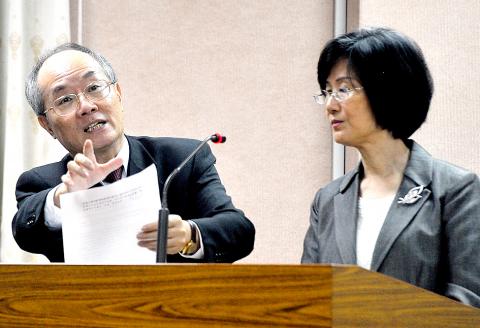Minister of Justice Lo Ying-shay (羅瑩雪) yesterday said that the resolution adopted on Monday by a legislative committee that all cases being probed by the Supreme Prosecutors’ Office Special Investigation Division (SID) be suspended and the division not investigate any new cases was “legitimately questionable.”
“This was a serious matter” and thus “was not for me to decide,” Lo said in response to media queries on whether the ministry would follow the resolution.
The resolution would destroy the judicial system because the SID is an legitimate institution based on the Organic Act of Court Organization (法院組織法), she said.

Photo: Chien Jung-fong, Taipei Times
Lo said she questioned whether the Judiciary and Organic Laws and Statutes Committee’s resolution could override the law by ordering the SID to halt operations.
The committee’s motion, which passed by a 4 to 3 vote, said the SID should turn its active cases over to regular prosecutors and stop taking new cases.
The committee has nine members, but its convener, Chinese Nationalist Party (KMT) Legislator Lu Hsueh-chang (呂學樟), did not vote because he can only vote in case of a tie.
Four of the members are KMT lawmakers and four are from the opposition. KMT Legislator Hsieh Kuo-liang (謝國樑) abstained rather than follow the party line and vote against the motion.
Hsieh said it made sense for the SID to stop handling cases for the time being because of the controversy over its operations.
If the SID were to handle highly sensitive cases, the results of its investigations would not be very credible, he said.
The committee also passed a motion to set up a task force to investigate the SID’s wiretapping activities that first exposed alleged improper lobbying by Legislative Speaker Wang Jin-pyng (王金平).

TRAGEDY STRIKES TAIPEI: The suspect died after falling off a building after he threw smoke grenades into Taipei Main Station and went on a killing spree in Zhongshan A 27-year-old suspect allegedly threw smoke grenades in Taipei Main Station and then proceeded to Zhongshan MRT Station in a random killing spree that resulted in the death of the suspect and two other civilians, and seven injured, including one in critical condition, as of press time last night. The suspect, identified as a man surnamed Chang Wen (張文), allegedly began the attack at Taipei Main Station, the Taipei Fire Department said, adding that it received a report at 5:24pm that smoke grenades had been thrown in the station. One man in his 50s was rushed to hospital after a cardiac arrest

SAFETY FIRST: Double the number of police were deployed at the Taipei Marathon, while other cities released plans to bolster public event safety Authorities across Taiwan have stepped up security measures ahead of Christmas and New Year events, following a knife and smoke bomb attack in Taipei on Friday that left four people dead and 11 injured. In a bid to prevent potential copycat incidents, police deployments have been expanded for large gatherings, transport hubs, and other crowded public spaces, according to official statements from police and city authorities. Taipei Mayor Chiang Wan-an (蔣萬安) said the city has “comprehensively raised security readiness” in crowded areas, increased police deployments with armed officers, and intensified patrols during weekends and nighttime hours. For large-scale events, security checkpoints and explosives

PUBLIC SAFETY: The premier said that security would be tightened in transport hubs, while President Lai commended the public for their bravery The government is to deploy more police, including rapid response units, in crowded public areas to ensure a swift response to any threats, President William Lai (賴清德) said yesterday after a knife attack killed three people and injured 11 in Taipei the previous day. Lai made the remarks following a briefing by the National Police Agency on the progress of the investigation, saying that the attack underscored the importance of cooperation in public security between the central and local governments. The attack unfolded in the early evening on Friday around Taipei Main Station’s M7 exit and later near the Taipei MRT’s Zhongshan

A car bomb killed a senior Russian general in southern Moscow yesterday morning, the latest high-profile army figure to be blown up in a blast that came just hours after Russian and Ukrainian delegates held separate talks in Miami on a plan to end the war. Kyiv has not commented on the incident, but Russian investigators said they were probing whether the blast was “linked” to “Ukrainian special forces.” The attack was similar to other assassinations of generals and pro-war figures that have either been claimed, or are widely believed to have been orchestrated, by Ukraine. Russian Lieutenant General Fanil Sarvarov, 56, head